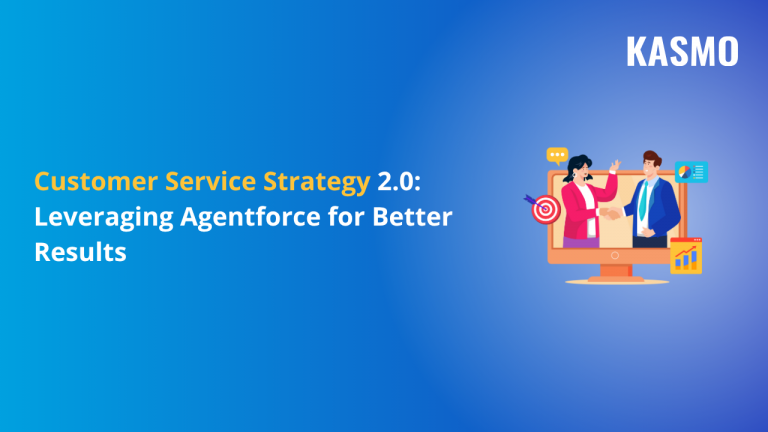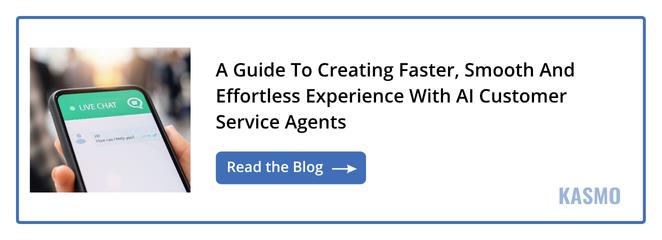Importance of a Good Customer Service Strategy
According to a survey conducted by McKinsey, “Omnichannel shopping is ascendant, with about 60 to 70 percent of consumers researching and purchasing both in-store and online across categories. Not surprisingly, social media influence is heaviest among younger consumers but influences all age groups, most commonly in categories including jewelry, accessories, fitness/sports, and cosmetics.”
This increased spending has increased pressure on businesses to deliver seamless and satisfying experiences to customers across all touchpoints. As consumers now want faster delivery of products and faster query resolution, businesses can fulfill these requirements by having an effective customer service strategy—a comprehensive plan that aligns people, processes, and technology to serve customers better.
One of the most powerful tools that helps businesses improve customer retention is Agentforce for Service. Leveraging Agentforce revolutionizes how companies engage with customers, reduce customer churn, and scale operations.
Understanding how to create a good customer service strategy is crucial. It acts as a blueprint for business leaders to train their employees, which helps them deliver consistent, high-quality support across all customer interactions. It defines the standards, channels, and tools employees need to use to ensure efficient issue resolution, personalized engagement, and long-term customer satisfaction.
A well-designed customer service strategy helps businesses transition from proactive customer service to reactive customer service. This changes the business model of organizations from “revenue-centric” to “customer-centric”, driving loyalty, enhancing satisfaction, and improving customer retention.
Why Do Businesses Need to Employ AI Agents Along with Their Human Workforce?
Agentforce’s AI agents, powered by machine learning and natural language processing (NLP), have become essential enablers of smarter, faster, and more scalable customer support.
Instant, 24/7 Support
AI agents can work around the clock without breaking down, offering immediate responses to common inquiries. Whether it’s tracking orders, resetting passwords, or answering FAQs, AI agents are more than just traditional chatbots – these agents ensure customers don’t have to wait, helping organizations meet customer demand in near real-time. With 77% of customers expecting immediate interaction when reaching out to a business, AI agents provide immediate responses without any delay.
Multitasking at Scale
Unlike human agents, AI agents can manage numerous conversations simultaneously, reducing wait times and ensuring no customer is left unattended. This scalability is critical during high-demand periods like holidays or product launches.
Intelligent Routing and Resolution
AI agents don’t just respond—they understand customer queries. Through data analysis and NLP, AI agents can detect customer intent, sentiment, and urgency, then route issues to the most appropriate channel or customer service representatives. This ensures faster resolutions and more personalized service. Salesforce Agentforce also generates step-by-step resolution plans based on customer queries, past interactions, and internal knowledge bases, improving operational efficiency.
However, it is to be noted – AI Agents, when integrated with the human workforce, provide the best results. AI agents don’t replace your employees; they are a part of the digital labor. Use AI Agents to amplify the potential of your human workforce.
While AI agents bring speed, scalability, and 24/7 availability, the human touch remains irreplaceable in creating hyper-personalized customer experiences. The most successful organizations recognize these customer service strategies and work towards fostering collaboration rather than creating competition between AI and employees. AI agents are not here to replace human agents—they are here to empower them.
What Is the Purpose of the Salesforce Service Assistant?
Salesforce is always on the lookout to help organizations and service reps to provide the best experience for their customers. Service Assistant was “scheduled to go live as part of Salesforce’s Spring ‘25 release in February 2025”.
Salesforce Service Assistant is an assistive AI agent (which means that it is not autonomous or conversational and is “built for service reps in the form of a Lightning web component that uses generative AI to suggest steps to resolve a case. There’s no conversational functionality included in the component”), designed to enhance the productivity and accuracy of human service representatives. Its core purpose is to streamline case resolution by providing agents with an automatically generated summary and a contextual, multi-step action plan—all directly within the Case Record Page.
Service Assistant is powered by Einstein Generative AI and Salesforce Data Cloud and is deeply integrated with key platform features, including Agentforce topics and instructions, Service AI Grounding, and Agentforce Data Libraries. These integrations ensure that every service plan is rooted in your unique CRM data, delivering accurate case summaries and actionable steps tailored to your business. To ensure optimal performance, Service Assistant requires a one-time setup of these Salesforce features.
Let AI Agents Handle Routine Tasks and Your Human Agents Focus on Building Customer Relationships
AI agents are exceptionally good at handling high-volume, low-complexity tasks such as:

This automation not only shortens resolution times but also reduces the workload on human agents, enabling them to concentrate on issues that demand soft skills, like pacifying frustrated customers, understanding nuanced problems, or navigating complex support scenarios.
For example, A retail brand uses Agentforce for Service to handle 70% of incoming queries related to shipping and product availability. For the remaining 30%, which includes billing disputes or complaints, AI Agents provide a comprehensive summary of the customer profile and the challenges they are facing to service reps. This blended model has reduced first-response time by 40% and increased CSAT scores by 18%.
The Human-AI Feedback Loop
Another key advantage of integrating AI Agents with your human workforce is that AI learns from human input. When agents override AI suggestions or provide feedback, the system adapts and improves over time. This feedback loop ensures AI agents don’t just get smarter—it gets more aligned with your company’s tone, values, and customer expectations.
At the same time, Agentforce empowers humans with data that were previously buried in silos. Agents can better understand the customer’s journey, identify intent, and respond accordingly, leading to faster and smarter customer service.
Benefits of Using AI in Customer Service Strategy
The synergy between AI and humans results in:

Enhanced Customer Experience
Customers benefit from faster responses, consistent messaging, and personalized service provided by AI Agents. Their ability to analyze data and learn from interactions means they can tailor recommendations and solutions based on each customer’s history and preferences.
Lower Operational Costs
By automating low-value tasks, businesses can significantly cut support costs. One AI agent can do the work of dozens of human agents for routine queries, reducing staffing requirements without compromising service quality.
Improved Employee Satisfaction
Reps spend less time on repetitive tasks and more time solving meaningful problems. This leads to reduced burnout, higher morale, and lower productivity—all of which are crucial to improving customer retention. Employees who are unburdened with extra administrative tasks will be able to think about and create strategies to improve customer retention.
Data-Driven Insights
AI agents continuously gather and analyze customer interactions, uncovering trends, pain points, and opportunities. These insights help teams refine service offerings and make data-driven decisions that align with long-term goals.
Omnichannel Support
AI Agents unify interactions across email, chat, social media, and phone, ensuring consistent messaging and fast responses.
Proactive Engagement
AI agents can trigger messages or offers based on user behavior, like following up on cart abandonment or checking in after a support interaction.
Personalization at Scale
AI agents analyze purchase history and preferences to tailor service and create upsell opportunities for service reps, improving customer engagement and increasing revenue.
How can Businesses Ensure a Successful Customer Service Strategy?
Step 1: Assess Your Needs
Before implementing any AI solution, define what problems you’re trying to solve. Are customers frustrated with long wait times? Do you struggle with inconsistent support across channels? Pinpoint the gaps to determine the best AI-powered applications to use.
Step 2: Choose the Right Tools
AI tools vary in complexity and use cases. Some common options include:
- Chatbots: Handle FAQs and common transactions.
- Virtual Assistants: Support agents in real time with suggestions, next-best actions, and historical context.
- Voice Assistants: Provide voice-based, hands-free support.
Step 3: Design a Seamless Handoff
Ensure AI agents can escalate cases to human agents smoothly when needed. This requires shared access to conversation histories, unified dashboards, and clear service protocols to avoid customer frustration.
Step 4: Train Your Team
Even the best AI tools require skilled human agents to manage complex cases, monitor performance, and engage with customers with empathy and understanding. Invest in continuous training programs that prepare reps to work alongside AI effectively.
Step 5: Monitor, Measure, Improve
Track key performance indicators (KPIs) like:
- First Response Time
- Average Handle Time
- Net Promoter Score (NPS)
- Customer Retention Rate
These metrics help gauge the effectiveness of your customer service strategy in real-time. Use these insights to make improvements in your customer service and stay ahead of your competitors.
Why Salesforce Agentforce Is the Right Choice for Businesses Aiming to Improve Customer Service Strategy
Handles Repetitive Inquiries Efficiently
Agentforce is designed to manage routine, less complex issues, such as FAQs and basic troubleshooting. Automating these interactions helps human agents to handle more complex tasks, boosting team productivity and improving customer satisfaction.
Seamless Handoff to Human Agents
One of Agentforce’s standout features is its ability to seamlessly transfer more complex cases from AI agents to human agents. These AI Agents provide a comprehensive overview of the customers’ conversation history and customer data. This eliminates the need for customers to repeat themselves, significantly reducing customer frustration and increasing chances of faster case resolution.
Enhances AI-Human Initiatives
Agentforce plays a critical role in bridging AI with customer support, helping organizations implement a robust customer service strategy. AI Agents ensure that both autonomous and assistive AI tools like the Service Assistant work together to streamline workflows and reduce friction in service delivery.
Built with Scalability
Designed to support high-volume customer data, Agentforce allows businesses to scale their customer service operations without sacrificing the quality of the customer experience. It provides consistent support to customers by continuously analyzing and learning from incremental customer data, ensuring that your customers always receive the best experience.
Conclusion
Businesses can no longer rely on outdated service models. The key to building a strong, scalable, and good customer service strategy lies in understanding how to make the right blend of digital labor and human workforce. Tools like Salesforce Agentforce and Service Assistant enable faster case resolutions, provide hyper-personalized experiences, and streamline workflows.
By strategically implementing AI in customer service, organizations can significantly reduce response times, lower operational costs, and empower service reps to focus on what they do best—building genuine customer relationships. A modern customer service strategy not only boosts customer satisfaction and retention but also drives long-term growth and loyalty.





